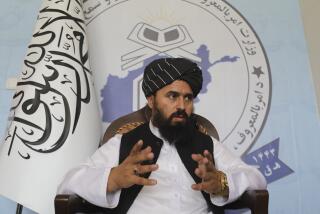Chaotic Kabul Has No Patience for Protesters
- Share via
KABUL, Afghanistan — At almost any hour of the day, the streets of this city are a congested, chaotic mash of noise and activity. Donkey-drawn carts, drivers who observe no discernible rules of the road and determined pedestrians vie for space in the dusty, narrow lanes. At times they come to blows.
So not everyone is pleased with the latest species of street life to surface here, making Kabul even tougher to navigate: protesters.
The Afghan capital has been hit by a wave of demonstrations over the last few weeks, organized by groups intent on taking their discontent and their demands public in the most palpable way possible.
Unhappy teachers, losing political candidates, retired soldiers and disabled residents have all rallied, increasing the frustration of those affected by the tumult.
“We are completely fed up with the protests happening around here,” said Abdul Matin Naseri, 25, whose watch shop is near government offices. “If it’s just one day, two days, three days, even a week, fine. But it keeps on going.”
It’s a lesson in the democracy that Afghanistan is trying to build from scratch after decades of repression and bloodshed. The right to peaceful assembly, officials say, is the privilege and price of a free society.
The string of protests, however, is also a sign of deepening public anger with the government of President Hamid Karzai. The country’s interim leader after the Taliban was overthrown in 2001, then winner of its first free presidential election last year, Karzai has had trouble bringing tangible improvements to the lives of his people. Illiteracy, unemployment and a lack of basic necessities remain endemic in Afghanistan.
Critics accuse Karzai’s administration of mismanaging the billions of dollars of foreign aid that have poured into the country.
“In the past four years, he hasn’t solved the problem of electricity and water or repaired the roads,” said Kabir Ranjbar, a political scientist at the University of Kabul. “These should have been his first public works in the city. And Kabul is a small city. If he can’t solve these problems, [people ask] what can he do?”
Ranjbar faults Karzai for not taking aggressive enough steps at the outset of his administration to disarm a population accustomed to rule by warlords and the heavily armed Taliban. This, Ranjbar said, has fueled a Taliban insurgency and brought on a measure of instability that has impeded orderly and sustained economic and social development.
Street crime in this city of nearly 3 million is up. Some international organizations, including various U.N. agencies, forbid their employees to venture out after dark because of kidnapping threats -- a prohibition that some call an overreaction but that shows the rising anxiety level.
“Under the Taliban there was security, there was a central government, no one was attacking anyone else’s property,” Ranjbar said. “They were imposing their views on the people, and they were bringing cultural darkness on Afghanistan. There’s no doubt they were taking Afghanistan backward. But people felt safe. Right now, nowhere in Afghanistan do people feel safe.”
One of Karzai’s declared priorities was to strengthen the nation’s ailing educational system. He promised teachers substantial pay raises, in some cases a 100% hike, and land for them to build houses on.
So a few weeks ago, when teachers heard that their $56 monthly salaries would grow by only $7, the faculty at Zarghona High, one of Kabul’s best girls schools, walked out of class the next day.
“The government says that they don’t have enough money. But they pay thousands of dollars to ministers, including for their travel and for hosting guests,” said Fatana, 35, a Pashto-language teacher who, like many Afghans, goes by one name. “The money they make in one day a teacher can’t make in a year. They tricked us.”
She and her colleagues, nearly 300 in all, marched through the streets blasting the government. The sense of outrage and solidarity was enough that they planned a second demonstration for the weekend, which other schools pledged to join. But the teachers allege that education officials pressured them into canceling the event.
“Karzai told the teachers and students, ‘We don’t have any money. Go home and study,’ ” said Royela, a 38-year-old geography teacher. She shook her head when asked if she thought anything would come of the protest.
Late last month, officials announced that they would meet some of the demands of retired soldiers who thronged Kabul’s central square for two or three days out of anger over low pensions. Traffic came to a standstill.
“They can come to the streets. This is something that is part of the democratic process, and the government of Afghanistan will listen and try to resolve their problems,” said Karim Rahimi, a spokesman for the presidential palace.
The demonstrations are a headache for the government because of their potential repercussions. Not only might more disaffected groups be encouraged to take their grievances to the streets, but the protests would probably further inflame anger among those whose lives are disrupted and could make the government look increasingly ineffectual.
Naseri, the shopkeeper, offers this solution: Build a dedicated protest ground somewhere, preferably far from his establishment.
“Or,” he said, “they should have rules and regulations for protests. For example, they can walk through the streets, but not block the streets.
“In a democracy, you’re allowed to speak out and express your opinions,” Naseri added, the morning sunlight glinting off the hundreds of watch faces around him. “But you’re not allowed to disturb others and make them close their shops.”
More to Read
Sign up for Essential California
The most important California stories and recommendations in your inbox every morning.
You may occasionally receive promotional content from the Los Angeles Times.














